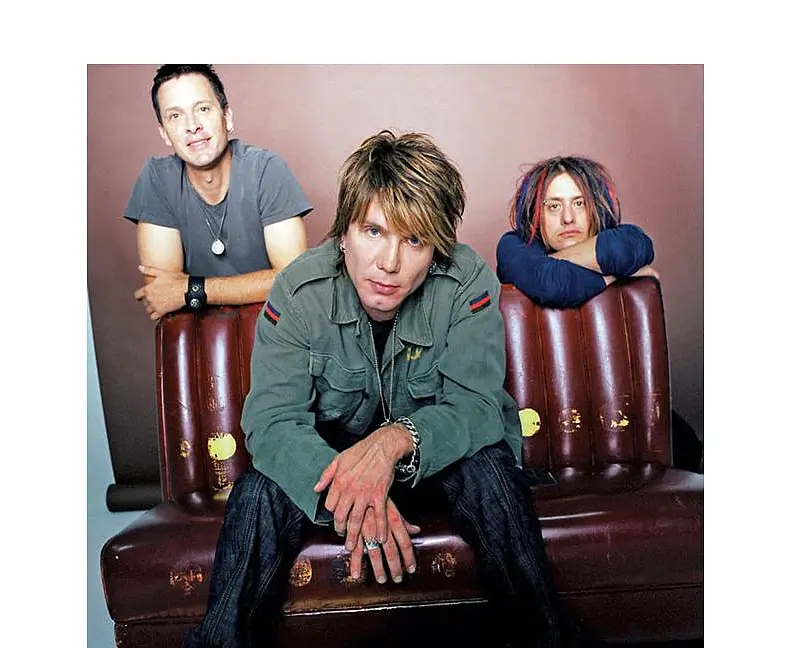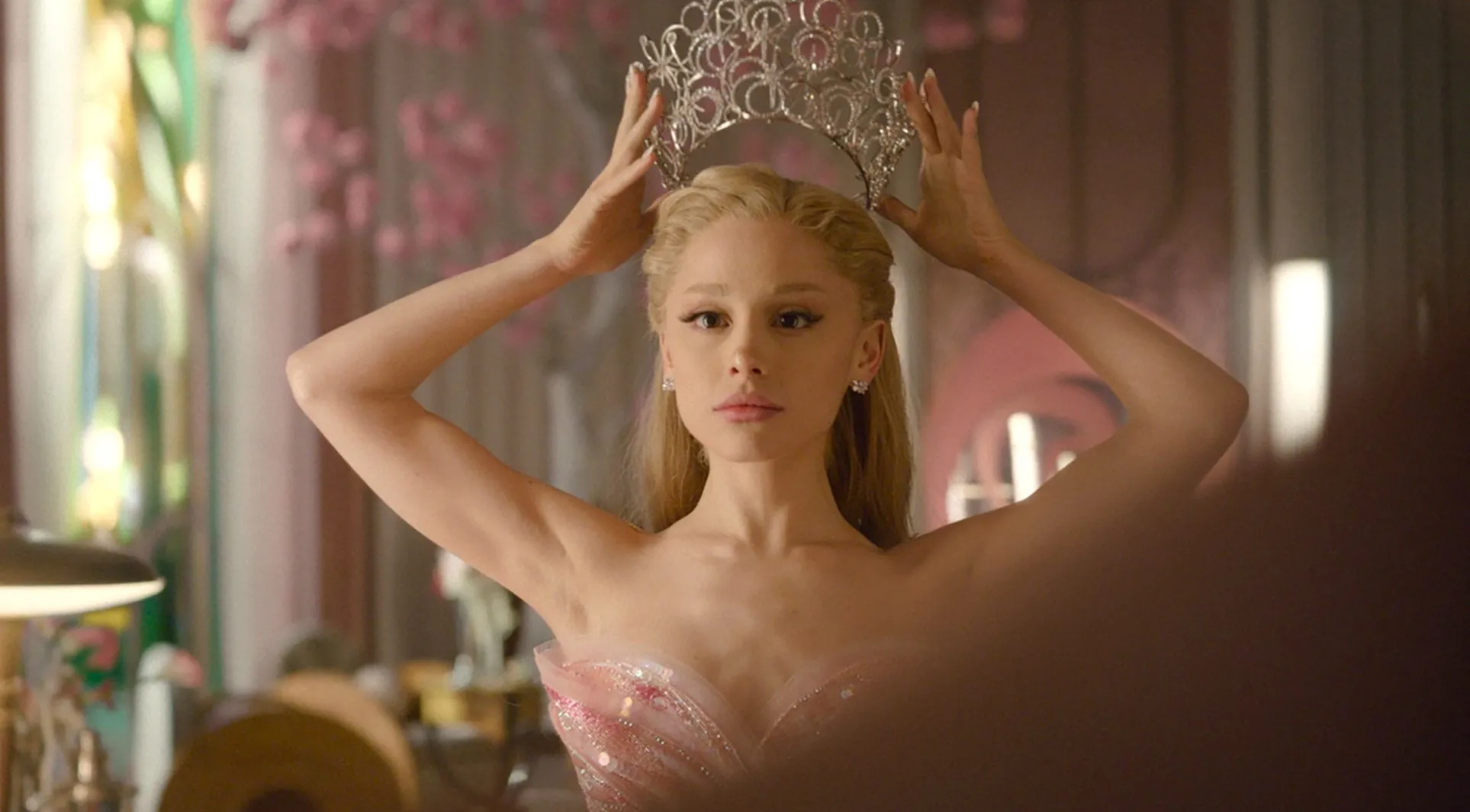intro
There are performances that remind audiences why a band survived the shifts of entire generations. The Goo Goo Dolls’ Tiny Desk Concert belongs squarely to that category. Filmed in NPR’s famously intimate office space—where records, books, plants, and the gentle clutter of creative life form an accidental stage—the band delivered a set that was both stripped down and fully illuminated, a testament to what happens when songwriting stands on its own legs.
For decades, the Goo Goo Dolls have occupied a peculiar space in American music culture: simultaneously mainstream and alternative, nostalgic yet continuously relevant. They are the band whose songs anchored coming-of-age film soundtracks, high school proms, and late-night drives in the early 2000s, but they are also the band that remained steady long after radio nostalgia stopped dictating trend lines. Tiny Desk, with its low ceilings and emotional transparency, becomes a perfect vessel for what this group uniquely offers: sincerity without spectacle.
Their appearance on the celebrated series operates like a time capsule cracked open, releasing not just memories but a renewed understanding of the band’s motivation in 2025 and beyond. It is both a return and a reset, a proof-of-concept for pure songwriting in an era dominated by overproduction and hyper-digital gloss.
flow
Tiny Desk has earned its reputation partly because it has a way of revealing who artists are without the armor of studio tricks. For the Goo Goo Dolls, whose catalogue has always been anchored by raw emotional resonance, the format plays like a homecoming. When you strip away the string sections and layered harmonies of their classic recordings, what remains is the songwriting—the bones and breath of what made them so enduring.
John Rzeznik’s voice, unmistakable and gently weathered, glides between strength and fragility. Robby Takac’s grounding presence adds a dynamic echo of the band’s earliest punk roots. The Tiny Desk setting acts like a sonic microscope, amplifying details often blurred by larger production: the grain in Rzeznik’s delivery, the warm analog ring of acoustic guitar, the soft percussive taps that humanize the rhythm.
The performance underscores the band’s ongoing artistic thesis: a song must hold its own even when the scaffolding is removed. That belief was tested—and passed—with quiet conviction.
stir
There is a cultural reason this Tiny Desk carries weight. The Goo Goo Dolls first emerged in an era predating algorithmic virality, when radio, MTV rotation, and live touring were the foundation of career longevity. Today’s landscape, driven by fragmented audiences and ephemeral trends, requires legacy artists to reintroduce themselves to each new generation.
Tiny Desk is an ideal platform for such reintroduction, not because it sensationalizes, but because it simplifies. Younger viewers—many discovering the band for the first time—encounter them without the weight of 90s mythmaking. Older viewers, meanwhile, are reminded of what made songs like Iris, Name, and Slide become cultural mainstays.
By appearing here, the Goo Goo Dolls reposition themselves not as nostalgia act, but as living participants in the contemporary acoustic storytelling lineage—aligned with newer Tiny Desk alumni like Phoebe Bridgers, Hozier, Laufey, and Noah Kahan. Their performance becomes a conversation across generations of writers who understand that emotional clarity, not sonic maximalism, is what ultimately leaves a mark.
gen
Any examination of the Goo Goo Dolls must acknowledge their gravitational pull on 90s and early-2000s culture. “Iris,” famously written for the film City of Angels, transcended soundtrack status and became something closer to a collective emotional experience. It is the kind of song that lives on wedding playlists, karaoke nights, and cinematic montages—a piece of songwriting with unusual longevity.
At the Tiny Desk, “Iris” arrives not as an anthem but as a confession. Stripped of its soaring orchestration, the song feels newly tender, almost private. Rzeznik leans into the simplicity of the melody, and the audience is invited to hear it the way it might have sounded the first time he played it in a small room, decades before it became ubiquitous.
“Name,” the breakthrough hit that first introduced the band to mainstream listeners, is similarly transformed. On record, it already carried the melancholy of open space; here, its acoustic textures bloom fully. The lyrics, which critique the compromises of fame while embracing vulnerability, feel strangely contemporary. In an age where artists document their careers in real time through social media, the sentiment lands with even more weight.
“Slide,” that buoyant, jangly burst of late-90s optimism, becomes less of a pop song and more of a folky storyteller’s piece, revealing just how cleverly it was written. Tiny Desk performances are notorious for exposing the weakness in overly produced songs. Yet here, the older tracks not only survive—they gain dimension.
new
What sets this Tiny Desk apart is that it is not a nostalgia revue. Interspersed with the hits are selections from the band’s more recent catalogue, which showcase their commitment to writing forward, not backward.
Over the last decade, the Goo Goo Dolls have quietly released albums that blend the emotional candor of their early work with a matured perspective shaped by time, sobriety, parenthood, and a changed industry. Their Tiny Desk performance incorporates songs from their latest project, offering clues to where the band sees itself creatively today.
The newer material feels more grounded, more reflective. Themes of connection, resilience, and self-repair echo through the lyrics, allowing the setlist to chart a narrative arc rather than a retrospective. The Goo Goo Dolls have never been a band that stands still, and their presence at Tiny Desk crystallizes this truth for both loyal listeners and fresh ears.
“Iris” at @NPR #tinydesk !! pic.twitter.com/SO8h5xs2uN
— Goo Goo Dolls (@googoodolls) November 19, 2025
show
What makes the Goo Goo Dolls’ Tiny Desk resonate is its lack of pretense. In an era when irony, satire, and self-awareness dominate digital culture, their performance is refreshingly earnest. There is no wink to the camera, no attempt to couch emotion in humor to protect themselves from vulnerability.
Tiny Desk rewards artists who are willing to be fully sincere—and few bands embrace sincerity quite like this one. The Goo Goo Dolls have always trafficked in open-hearted lyricism, and seeing them in a room where the audience is often no more than ten feet away emphasizes the courage required to be earnest in public.
The concert becomes a reminder that earnestness is not outdated. It is simply rare.
perform
The setting of Tiny Desk—its shelves cluttered with random objects, its warm natural lighting, its improbable blend of casualness and cultural prestige—invites reflection. Many viewers instinctively connect the performance to memories of their own adolescence or early adulthood.
For some, the Goo Goo Dolls were the soundtrack to relationships formed and broken. For others, they were the soundtrack to self-discovery, college years, or the first time music felt like something more than sound. Tiny Desk taps into that emotional archive and brings it into the present.
But the performance also works as memory for the band themselves. Rzeznik and Takac have been on the road for over thirty-five years. Their Tiny Desk appearance acts as a pause, a breather, a moment to re-center before re-entering the larger machinery of touring and promotion. The stripped-down arrangement feels like a return to their earliest days playing small clubs in Buffalo—an echo of origin with the clarity of hindsight.
resil
The Goo Goo Dolls’ longevity is not accidental. The band has navigated lineup changes, musical shifts, industry turbulence, and the personal battles that come with long-term artistic life. They endured early years defined by scrappy punk energy, a meteoric rise triggered by “Iris,” and the strange pressure of becoming a household name while still wanting to innovate.
Rzeznik’s well-documented struggles with addiction and his journey into sobriety inform the palpable clarity of his modern performances. There’s a steadiness in his presence, a kind of seasoned groundedness that gives the Tiny Desk performance emotional depth beyond nostalgia.
The Goo Goo Dolls have remained standing because they learned how to evolve, to adapt without losing the emotional core that made them resonate in the first place. Tiny Desk becomes a microcosm of that adaptability: intimate, unvarnished, yet full of quiet determination.
why
Legacy artists often struggle to find a platform where their full story can be told without distortion. Traditional interviews tend to focus on past glories; late-night TV emphasizes quick entertainment; awards shows favor spectacle. Tiny Desk, meanwhile, offers something akin to narrative reclamation.
For viewers, the performance becomes a recalibration of perception. The Goo Goo Dolls are not merely “the band who made that song everyone knows.” They are craftsmen of melody and emotion who, when placed in the right setting, reveal the fullness of their artistic identity.
For younger listeners encountering them for the first time, this performance becomes an entry point. It bridges generational divides and positions the band within today’s acoustic-forward musical landscape, where intimacy is currency and authenticity is a form of artistic capital.
culture
In the days following the release of a Tiny Desk performance, social media reliably becomes filled with renewed appreciation, rediscovered memories, and newly formed fan communities. Clips circulate on TikTok; reaction videos appear on YouTube; music writers craft think pieces about the band’s legacy.
The Goo Goo Dolls’ Tiny Desk triggers that cycle with unusual potency. Comments from viewers reflect a blend of shock (“I forgot how good they are live”), gratitude (“this healed part of my teenage heart”), and newfound admiration from audiences too young to have lived through the band’s original peak.
This is the afterglow of musical longevity: the chance to be rediscovered, recontextualized, and reappreciated.
impression
Tiny Desk’s ethos—small stage, big emotion—serves the Goo Goo Dolls especially well. Their music, long associated with sweeping arrangements and radio-ready choruses, becomes more intimate, more tactile. Instead of diminishing the songs, the scaled-down setting magnifies them.
The performance invites listeners to hear the Goo Goo Dolls the way fellow musicians hear them: as songwriters first, performers second. It becomes clear that the songs were built for durability rather than trend allegiance. The melodies survive decoupling from studio production because they were always fundamentally strong.
This shift in perception is subtle but significant. It reframes the band not as relics of a past sound, but as authors of timeless emotional narratives.
No comments yet.








